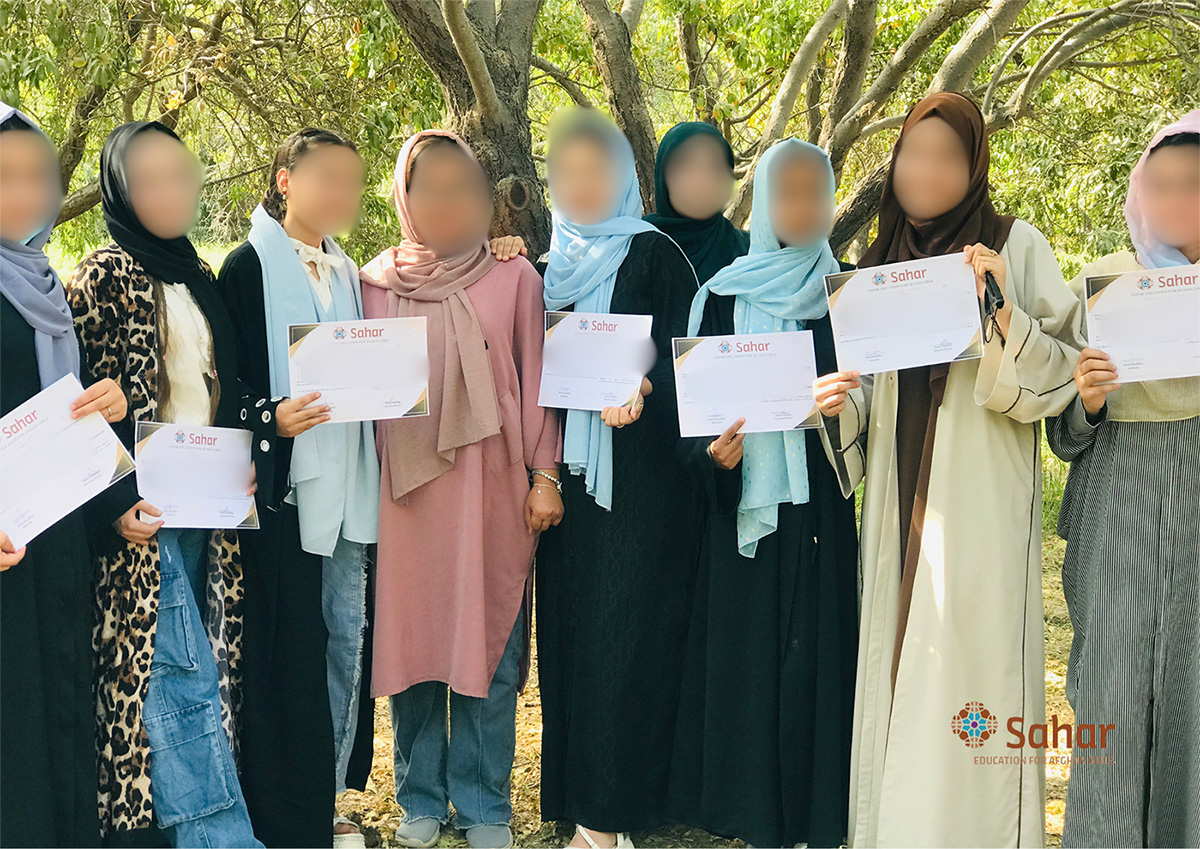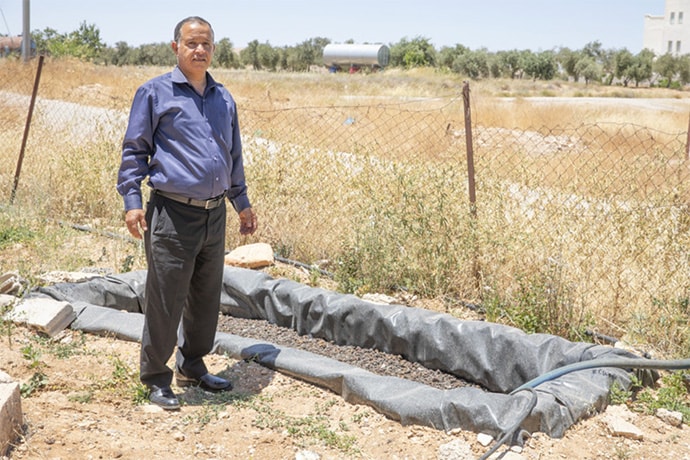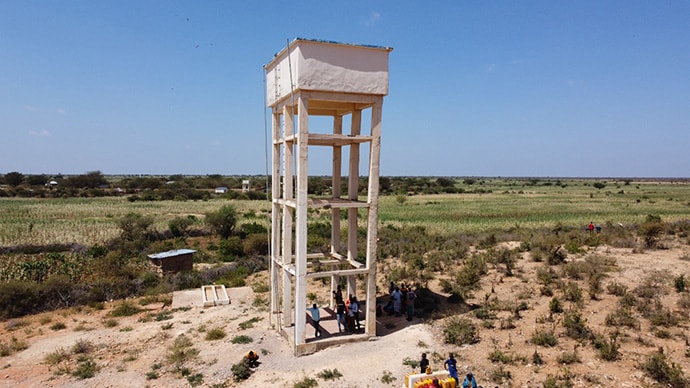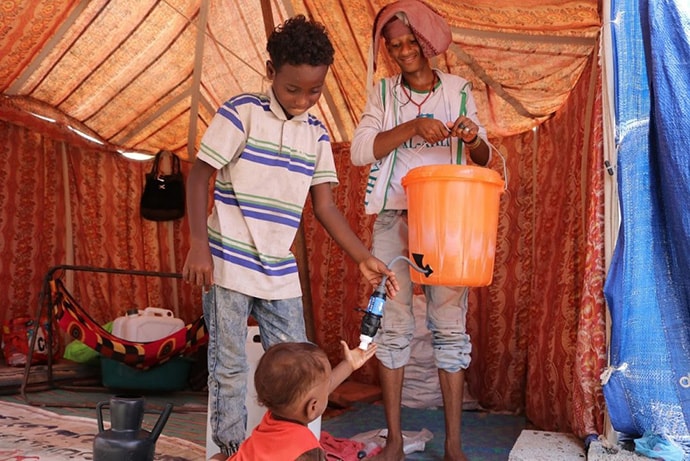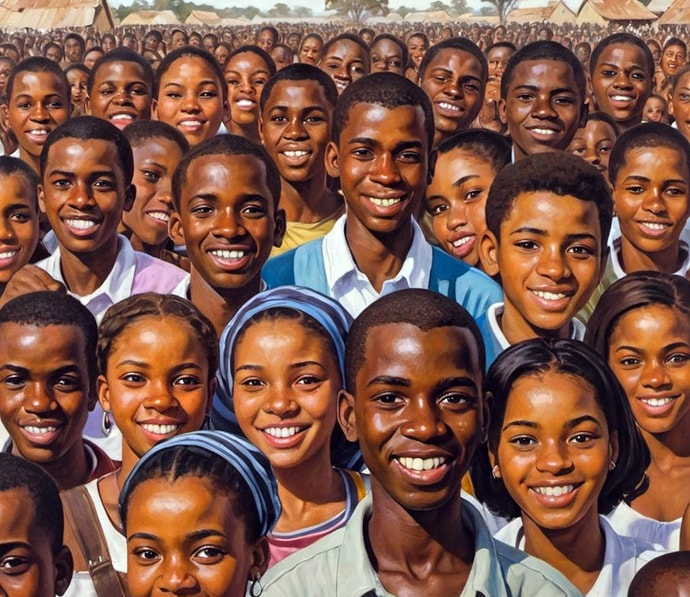IN THIS ISSUE
Letter from our Executive Director
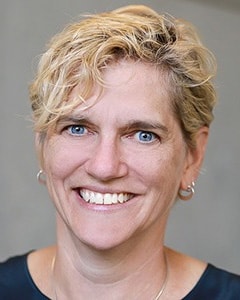
Unsafe water, inadequate sanitation, and insufficient hygiene kill 3.5 million people every year, and water scarcity affects more than 40% of the global population. These are staggering numbers, yet GlobalWA members show an amazing amount of ingenuity and resourcefulness when it comes to ensuring WASH in the communities where they work.
In our Issue Brief you will read about how our members have created key partnerships, innovative solutions, and strong monetary commitments to ensure safe water, appropriate hygiene, and innovative waste and sanitation solutions in low- and middle-income communities.
Included are also articles about a key partnership between World Vision and Rotary International safeguarding water for communities in Ethiopia, as well as a revealing interview with a Ugandan WASH expert from The Hunger Project.
GlobalWA members illustrate amazing adaptive solutions in the face of climate change, growing and shifting populations, and the need for new innovations. We hope you will be as inspired as we are!
Jane Meseck
Interim Executive Director
Back to Top
Issue Brief
Closing the Resource Gap: How Clean Water Changes Lives
By Aneesh Chatterjee
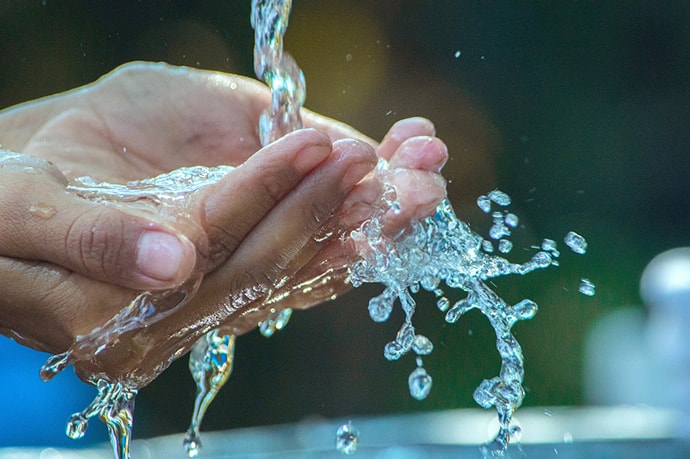
Photo: drfuenteshernandez/Pixabay
Members at Global Washington take innovative steps to address the global water crisis. Communities impacted by a lack of access to clean drinking water, proper sanitation infrastructure or an awareness of healthy sanitary practices, are facing disease, malnourishment and problems in other sectors, spilling into education and local markets. To that end, organizations are bringing unique solutions that address the crisis at multiple levels of operation, closing the gap between clean water and at-risk communities.
For the Starbucks Foundation, partnerships are integral to making a genuine impact on the future of water. With multiple partnerships and projects across countries, Starbucks spotlights water conversation as a strong priority. Part of their 2020 plan to reduce their water and waste footprint to 50% by 2030, a total of 50 million USD in grants was announced in March 2023, marking their commitment to building a resilient ecosystem for long-term sustainability. Partnering with other members of the United Nations Water Resilience Coalition, the United States International Development Finance Corporation and other collaborators, Starbucks launched the grants initiative with an initial pledge of 25 million USD to WaterEquity’s Global Access Fund IV, with an intended mobilization of new funding parties to match their investment. The initiative aims to fund access to WASH facilities, products, and services across countries reaching up to 5 million beneficiaries.

Other prolific partnership-driven projects include their work with The Nature Conservancy to replenish the water of Qiandao Lake in Zhejiang Province, China with an investment of 3 million RMB, and their joint venture with World Vision, Alsea Foundation and Planet Water Foundation to install 25 water towers in Mexico and provide safe water access to 45,000 people. Their ongoing partnership with the Planet Water Foundation, established in 2021, has brought clean water access to over 100,000 people across Cambodia, India, Thailand, Indonesia, Laos and the Philippines with the construction of 57 water towers.
These tangible, on-the-ground construction of deliverables – a product of Starbucks’ partnerships and resource mobilization – are effective interventions also used by Heifer International. With practical devices installed for specific community needs, Heifer’s projects bridge the resource access gap in similar ways: the installation of hand-pumped wells in Vietnam and cisterns in Haiti have reduced significant travel time for locals, bringing quick access to water without the need to manually transport water from a known source.

In turn, easy access further simplifies efforts to teach and inculcate proper hygiene and sanitation practices. In Senegal, Heifer’s extensive efforts to improve water access has led to solar-powered wells drilled in close proximity to local residences. Beyond sanitation, hygiene and health benefits, the improved accessibility has also positively impacted the health of their cattle, higher agricultural yield, and increased income potential for families. Although WASH is a central focus of these interventions, the benefits impact sectors beyond water supply management, spilling over to economic resilience and agricultural prosperity.
Construction projects leading to promising sustainable development in related sectors is also seen in high-impact projects by Gargaar Relief Development Organization (GREDO), and their goals to improve schools in Somalia. Water and sanitation facilities being one of the underdeveloped facets of local schools, with others being inadequate classroom space and insufficient teaching staff, GREDO has built two new schools with expanded classroom spaces, proper washroom facilities, and other capacity building measures to support the management of education in schools.
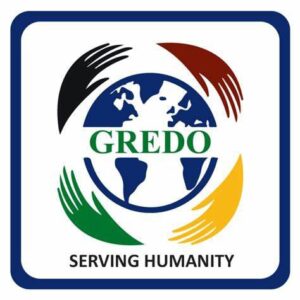
GREDO’s work to redevelop schools includes special considerations for effective latrines, an integral component for reliable WASH infrastructure. On a broader scale, the Bill and Melinda Gates Foundation works extensively to develop sanitary, effective toilets and improve waste management infrastructure across China, Sub-Saharan Africa and South Asia. A multi-strategy approach includes adaptive innovation to evolve traditional toilet infrastructure for different regions, including chemical treatment, water recycling and pathogen removal through low-cost designs powered with renewable energy.

Adaptive technologies prove to be essential not only in revolutionizing traditional infrastructure, but emergency response as well. To that end, Oxfam provides unique solutions for immediate relief in regions following environmental disasters. In the wake of Cyclone Idai in Mozambique, their Livesaver Cubes allowed for quick and portable filtration of contaminated water, as available infrastructure had been destroyed. In 2018, Oxfam brought the SkyHydrant – a tool for converting groundwater into drinkable water without chemical treatments – to Palu, Indonesia, following a tsunami. In Somalia, Oxfam provides solar-powered water desalination units to decontaminate water for drinking and livestock. The construction of a 100-kilometer pipeline in the DRC, solar-powered water treatment plants in Sudan, and a gravity well system in Nepal all encapsulate adaptive innovations by Oxfam to bring communities back from the brink, and closer to reliable water access.

Also working in disaster response is the Yemen Relief and Reconstruction Foundation. Their Water Purification and Renewable Power (WARP) systems, built for both natural disasters and war zones, aims to bring clean drinking water to 3 hospitals in Hudaydah.
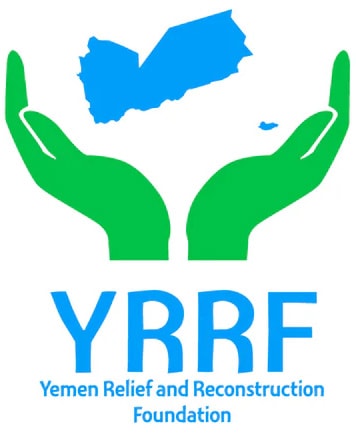
Like the Starbucks Foundation, Mercy Corps uses strategic partnerships to leverage resources and energy in building WASH resilience across global communities. Their Public Private Partnership (PPP) approach aims to work with local governments and communities to implement WASH interventions that directly bridge the resource gap in targeted regions. Collaborations with the authorities in the DRC, for example, have allowed Mercy Corps to implement their IMAGINE Program, extending water supply access for the cities of Goma and Bukavu – bringing safe water access to 1.5 million beneficiaries.
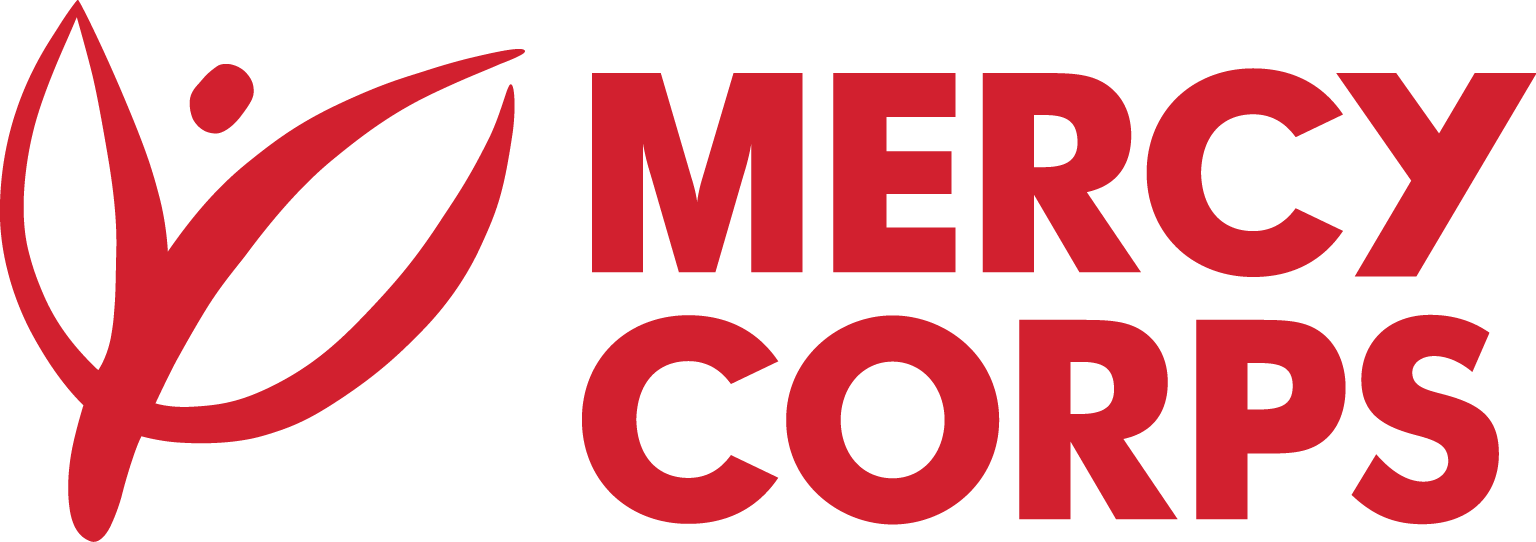
Promoting awareness as a resilience strategy is also one of the approaches adopted by Mercy Corps. Awareness campaigns leading to the instillation of stronger hygiene practices are emphasized as powerful measures against the spread of disease, particularly in the wake of the Covid-19 pandemic, in Mercy Corps’ 2021 WASH Approach document. An additional arm of their awareness strategy is the promotion of more resource-conscious use of water and WASH facilities once constructed, including their operation and management. By promoting an awareness of the importance of efficient and sustainable use of water in regions where scarcity is rampant, communities are guided toward sustainable management of their resources for long-term health benefits.
Promoting resource consciousness also entails showing communities how to best use what’s available, as demonstrated by Sukarya. Taking on the malnutrition crisis in India, of which clean water access is an integral cornerstone, Sukarya’s targeted interventions focus on building awareness of nutrition, educating communities on how to best use their most accessible resources, and providing vital supplements and micronutrients to at-risk populations. Promoting knowledge of breastfeeding and its importance for child nutrition is a key goal across their programs, alongside raising awareness of what produce, grains and other foods are locally available for any given community, distributing easy recipes that prioritize efficiency and nutritional value, setting up health centers and medical testing camps, group information workshops, cooking demonstrations, and distributing essential nutritional supplements.
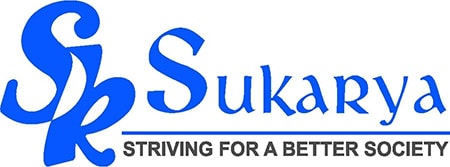
Sukarya upholds WASH interventions as a consistent priority in their programs, with implementation models for both school and community levels. For students, raising awareness about the importance of hand washing, water-borne disease and sanitation habits builds resilient behaviors, while information sessions and awareness campaigns for communities at large establish simple but effective sanitary habits to prevent illnesses.
Encapsulating the power of resource consciousness and mobilization of impactful actors, the Bill and Melinda Gates Foundation also takes steps to build resource-aware communities through effective partnerships that incentivize the shift toward water-conscious markets with new service models for local economies. New models provide financial incentive for both private and public actors, encouraging the use, delivery and deployment of newer WASH technologies. A strong focus on policy advocacy for local governments ensures that communities adapt efficiently to implement vital technologies, practices and habits that close the resource gap for millions of beneficiaries.

All-rounded approaches, from emergency tools and technologies to hygiene education and project monitoring, can be seen in the work of Water1st, with their pipeline projects bringing drinking water and sanitation relief to communities across India, Bangladesh, Kenya, Ethiopia, Honduras, and Mozambique. WaterAid works to combat cholera outbreaks with sanitation training, relief kits and handwashing stations across 22 countries.

From specialized focus projects to broad-spectrum sector innovation, participating actors are innovating to bring people closer to clean water, with lasting impact on the spread of disease, malnourishment, emergency response, and community development. Water proves to be essential not only for the health and wellness of individuals, but the proliferation of agriculture, livestock, strengthening family income, enabling schools to teach and bringing more students into classrooms, mobilizing governments and private actors to adapt and implement solutions, and beyond.
The following GlobalWA members are supplying innovative and resourceful solutions for WASH in the communities where they work.
Gargaar Relief and Development Organization — GREDO
GREDO takes a comprehensive approach to developing and strengthening the water sector in Somalia. At the core of their strategy is the drilling and rehabilitation of various water sources, including boreholes, earth dams, shallow wells, and pipeline extensions. GREDO collaborates closely with key stakeholders, such as the Ministry of Water and WASH clusters, to align its interventions with sectoral priorities and gaps.
Upon completion of the water infrastructure projects, GREDO transfers the management of boreholes to local water supply companies, establishing a partnership framework for sustainable operation and maintenance.
During emergencies, GREDO rapidly implements water trucking projects to deliver potable water, complementing its long-term rehabilitation initiatives. The aim is to ensure reliable access to clean water, even in the face of natural disasters.
GREDO also emphasizes the need to strengthen the capacity of local authorities and communities in water governance, climate change adaptation, and multi-stakeholder partnerships. The goal is to develop resilient and sustainable water systems in Somalia.
Overall, GREDO’s comprehensive approach focuses on improving water access, empowering local stakeholders, and building long-term resilience to address the country’s critical water challenges.
Global Communities
Global Communities catalyzes community action to strengthen systems that deliver water, sanitation and hygiene (WASH) services. Advancing water security is among our top priorities both in crisis settings and stable environments. For example, we work with local partners to improve water resource management, protect watershed ecosystems, and increase sustainable and equitable access to safe drinking water. Our WASH interventions include community mobilization, infrastructure improvements and climate adaptations. We also work to improve WASH governance; strengthen the capacity of WASH service providers; and create an enabling environment for private sector participation in the WASH sector. Our behavior-led approaches address factors that influence the adoption of optimal WASH practices.
Landesa
Landesa champions and works to strengthen land rights for millions of those living in poverty worldwide, primarily rural women and men, to promote social justice and provide opportunity. Across the world, access to land is often intertwined with access to water. Strong land rights can enable a family or community to both use a clean water source and ensure the water remains safe.
In India, Landesa partnered with West Bengal’s State Government to allocate micro-plots of land—large enough to build a home and plant a garden—to families in rural areas to alleviate extreme poverty and hunger. Legal land ownership was a prerequisite to accessing various government benefits, including drinking water and sanitation hook-ups. Through Landesa’s work, different government agencies were better able to collaborate and offer a foundation for families to build a healthier, more stable future. This collaborative micro-plot program scaled across West Bengal and brought land, clean water, and hope to hundreds of thousands of people.
Mercy Corps
Mercy Corps is a global team of nearly 6,000 humanitarians working in more than 40 countries to create a world where everyone can prosper. We work alongside communities, local governments, forward-thinking corporations, and social entrepreneurs to achieve four interconnected goals: for people to have clean water, sufficient and nutritious food, sustainable economic opportunities, and a peaceful life free from conflict. Climate change is worsening and intensifying conflicts by affecting natural resources such as water, land, and forests.
Mercy Corps’ pathway to water security moves us closer to a world where people have equitable and sustained access to clean and safe water to meet their everyday needs. Through our programs, partnerships, and influence, Mercy Corps helps sustain improvements in clean, safe, and equitable water access – even in times of crisis. By sequencing, layering, and integrating our peace, humanitarian, and development assistance, we strengthen the capacity of communities and the water systems they rely on to cope, adapt, and thrive.
Oxfam
Oxfam is widely recognized as a leading organization supporting affected populations to access water, sanitation, and public health service and resources (WaSH). From drilling wells for Palestinian refugees in Jordan in 1962 to the present-day, Oxfam and partners have been at the forefront of humanitarian WASH responses worldwide. In the last year alone, Oxfam and partners have supported 7.7 million people with WASH through enhanced humanitarian action. Many others have benefitted from sustainable development interventions, such as Oxfam’s work with governments and the private sector to deliver long-lasting services. Innovation has been at the center of Oxfam’s work in WASH, with innovations in technology and approaches to WASH implementation now being widely adopted by the WASH sector.
Oxfam’s visions is that women, men and children affected by disaster, conflict, and the impacts of climate change will have access to safe, appropriate and high-quality WaSH services that enable them to mitigate public health risks in a dignified way.
Path From Poverty
Path From Poverty has been partnering with women in rural Kenya for 25 years because the empowerment of women is critical to breaking the cycle of poverty. In the rural Ukambani region, as in many areas of the world, women and girls face the constant risk of sexual assault and wild animal attacks because of their daily walk for water. This water is necessary for survival yet not even fit for human consumption. Path From Poverty provides rainwater catchment tanks that are installed at women’s homes. Access to clean, safe water has profound impacts. Women and girls are safer from violence. Girls have time to attend school and study, opening doors for future opportunities. Women have time for income generation, caring for their families, and rest. The health of families is improved, and money that women spend treating waterborne illnesses can be devoted to children’s school fees, purchasing healthy food, and expanding their micro-enterprises. Rainwater catchment tanks are vehicles for change, allowing women to devote their time to personal development and creating brighter futures for themselves and their families. This economic empowerment strengthens their position within the family and community.
Water1st
Water1st is on a mission to free women and girls around the world from the burden of water collection, liberating their time and energy for education and paid employment.
Water1st is committed to meeting the standards of SDG6 – every Water1st project includes a 24/7 supply of safe water at household faucets and a toilet.
Water flowing from a household tap makes it possible to have sufficient water quantities to perform the most critical public health activities like washing hands and using a low-flush toilet. A faucet at the home has also been proven to increase income, educational achievement for girls, and the likelihood the water system will be sustainable over the long-term.
Water1st’s locally-led partners have constructed more than 4,700 community-managed projects to date, eliminating over 123 million hours of grueling water-carrying by females. Over 99% of systems constructed since Water1st’s founding in 2005 are still supplying water today. The return on investment in these projects based on time-savings alone is over 700%.
Communities in low-income settings around the world face many challenges. The pathway to a better future begins with household access to piped water and toilets.
Back to Top
Organization Profile
Joint Interventions for Ethiopia’s Water Crisis: World Vision partners with the Rotary Foundation
By Aneesh Chatterjee
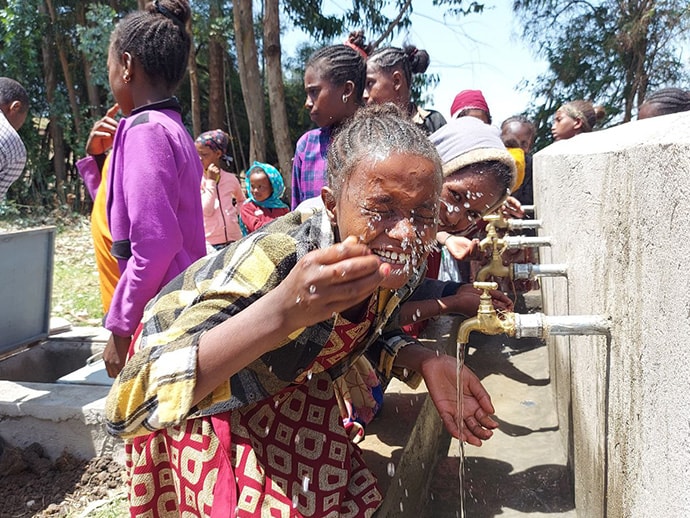
Community Water Point- Nono Chemeri -Abdi Boru Primary School, Yaya Gulele, Ethiopia. Photo: World Vision
Facing the fallout of ongoing armed conflict, impending natural disaster and subsequent resource scarcity is Ethiopia, ranking at 9 out of the top 10 most at-risk countries for humanitarian emergencies on the Independent Rescue Committee’s 2024 Emergency Watchlist. From a three-year drought to overbearing floods in vulnerable regions, rampant food and water insecurity is projected to be on the rise, driven by military tensions and an influx of displaced persons from neighboring states. In Ethiopia, and across Somalia, Kenya, Djibouti and Eretria, an estimated 20 million people are predicted to be in dire need of food and water assistance by UNICEF.
In turn, organizations have taken steps to mitigate the crisis and build resilience in communities from the ground up. The Rotary Foundation and World Vision (a member of GlobalWA since 2009), with decades of multi-sector experience in global development and crisis management, have partnered to address water scarcity in Ethiopia through specialized, on-the-ground interventions in targeted communities. Their efforts not only include the establishment of access to vital resources like clean water, but an inculcation of sanitation habits and community-mobilized hygiene awareness that promises long-term resilience against diseases and malnutrition.
Tim Arnold is a long-time Rotarian with the Redmond Rotary Club and Rotary District 5030 and deeply involved in the water project in Ethiopia. He emphasizes the urgency of their mission. “We realized that without clean water, everything else we were trying to achieve—education, health, economic stability—was being undermined. Clean water is the foundation upon which sustainable development is built.”
To learn more about their collaboration in Ethiopia, GlobalWA spoke with Brian Gower, Senior Director of Foundations and Partnerships at World Vision.
What is the Rotary Foundation?
Rotary is the largest civil society organization in the world, with a global network of 1.4 million neighbors, friends, leaders and problem solvers who unite to create lasting change – across the globe, in our communities, and in ourselves. Rotary is known globally as a leader in eradicating polio, contributing more than $2.1 billion and countless volunteer hours to protect nearly 3 billion children in 122 countries from this paralyzing disease.
Since 2002, World Vision has been a collaborating partner with Rotary on large-scale global grants focused on water, sanitation and hygiene (WASH) and a number of other sectors. Together, both organizations have invested $50 million dollars in collaborative projects, transforming the lives of over 56 million people around the world.
A featured partnership project of 2023 was in a rural area of Ethiopia called Yaya Gulele.
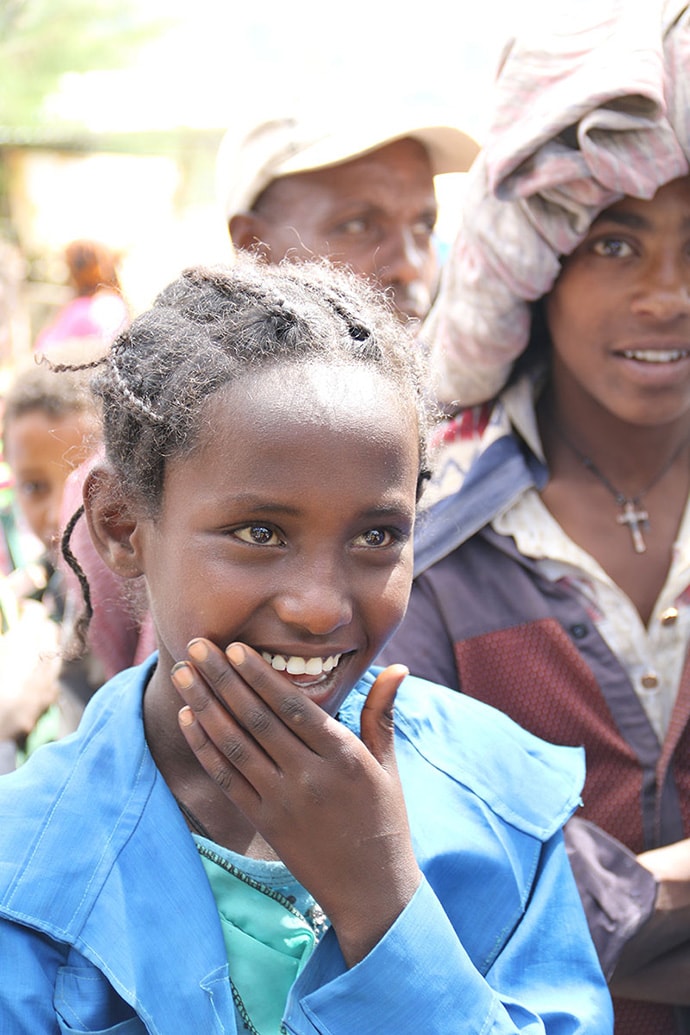
Schoolgirl, Yaya Gulele, Ethiopia. Photo: World Vision
Why did World Vision partner with the Rotary Foundation?
World Vision understands the importance of our joint ventures. Rotary recognizes the value of World Vision’s expertise and professionalism, our focus on sustainability, and our diligence in reporting and accounting. Also, with matters of intervention, World Vision’s local staff bringing a physical presence with feet on the ground have significant impact when working with local governments. The Rotary Foundation’s trust was demonstrated when they selected World Vision as a partner for the first Program of Scale grant of $6M, and most recently for a $30M grant with the Rotary Health Communities Challenge.
Why did you choose the Yaya Gulele region in Ethiopia for this initiative?
Ethiopia ranks 173 out of 187 countries on the 2014 Human Development Index. The average household income is 100 USD per month, and 34.7% of the population lives below the poverty line.
Of the 84 million people living in rural Ethiopia, 69% lack access to clean water or rely on unimproved water sources and 96% lack access to safe sanitation. In Ethiopia, 60-80% of communicable diseases are caused by a lack of safe water access, poor sanitation facilities and scarce hygiene practices. In addition, an estimated 50% malnutrition-related problems are caused by environmental factors surrounding the lack of basic sanitation in the region.
There are strong links between sanitation and stunting, and open defecation can lead to fecal-oral diseases such as diarrhea, which can cause and worsen malnutrition. Diarrhea is the leading cause of child mortality rates in Ethiopia, accounting for 23% of all deaths of children under 5 – more than 70,000 a year.
Yaya Gulele is a district in the North Shwa Zone of Oromia state. World Vision has been operating there since its inception in 2007. The district has a total of 24 schools, but only a few of them have their own safe drinking water supply. Thus, World Vision and Rotary – in collaboration with the district administration and local communities – has planned the construction of a water supply project from multiple sources for many of these rural and semi-urban schools. Most of the water sources, including shallow wells, will be equipped with solar power options to draw water.
Furthermore, learning cannot proceed properly without WASH facilities in schools. Integrating practical activities around safe drinking water, sanitation, and handwashing into lessons and daily tasks help reinforce the adoption of healthy behaviors in students and their families.
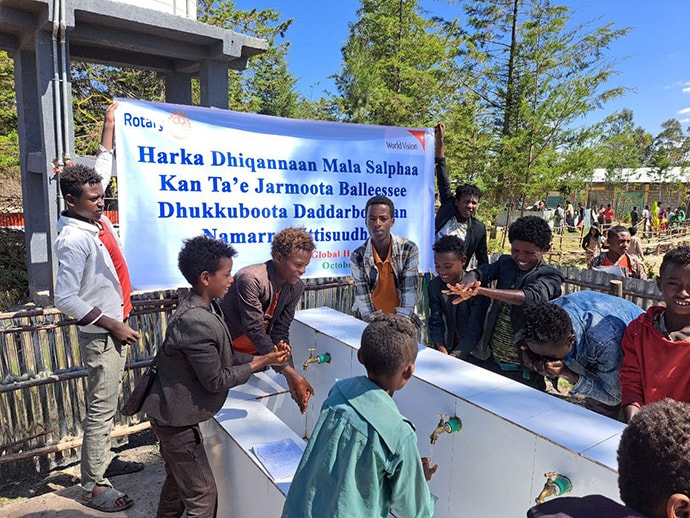
Global Hand Washing Day Celebration at Fital Primary School, 2024, Yaya Gulele, Ethiopia. Photo: World Vision
What is the scope of this collaboration?
The is a collaborative project between the Rotary Club of Redmond (District 5030), the Rotary Club of Addis Ababa Bole, World Vision US, and World Vision Ethiopia. The project duration is 2 years, with a total budget of $680,000, including $340,000 raised by Rotary and the rest matched by World Vision.
One of the areas in the original proposed plan for intervention was called Daleti. World Vision and Rotary were unable to access this location due to the insecurity and conflict. This area was going to provide WASH to the Dirre Daleti primary and secondary schools, reaching 963 students and 28,062 people from the surrounding community. Other schools impacted were Nano, Tigi, Illu, and Qare Yasa primary schools with a total of 2,509 students and nearby community members.
Rotary and World Vision came together on the 15th of March, 2023, and decided on an alternative site called Fital Town. Although Fital has fewer schools (9, compared to Daleti’s 14), the number of beneficiaries at Fital are 48,719 – significantly more than those in the Daleti site, on account of Fital Town being a semi-urban center with a higher population density.
What are the project’s goals?
This WASH in Schools project aims to improve the health and learning performance of school-aged children – and, by extension, that of their families – by reducing the incidence of diseases related to water and sanitation. WASH in Schools focuses on the development of life skills and the mobilization of parents, communities, governments and institutions to work together to improve hygiene, water access and sanitation conditions. Interventions for this project include the construction of safe water supply points, hand washing stations and sanitation resources. Fully integrated life skills education, focusing on key hygiene behaviors for school children, are also a priority. Ventilated, accessible pit latrines with access ramps are to be added, as well as access to menstrual hygiene products for girls.
To ensure long-term feasibility, teachers and community members will be trained on the operation and maintenance of water supply structures. Replacement parts are readily available in local markets. The supervision of any major maintenance needs will fall to the Education Office of Yaya Gulele, in collaboration with the Water Office.
Rotarians, in particular, will supervise the overall project implementation, manage progress reports, participate in review meetings with all pertinent stakeholders and partners, and ensure that set standards of implementation are being met.
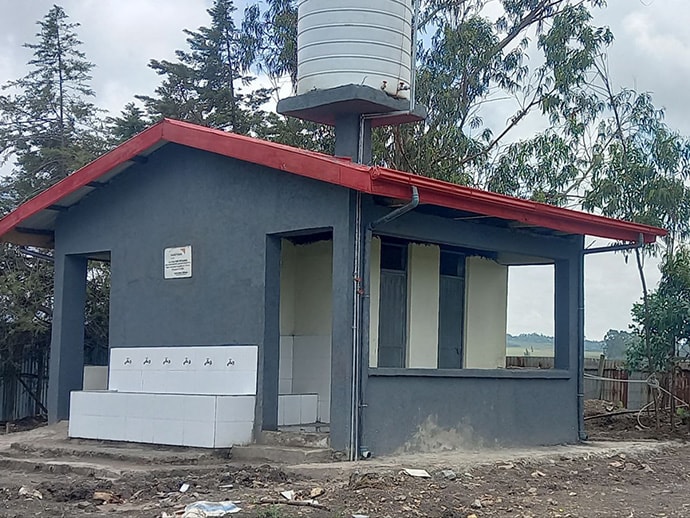
VIP Latrine -Burka Aleltu (for girls), Yaya Gulele, Ethiopia. Photo: World Vision
What are some of the biggest challenges you’ve faced?
The ongoing conflict between the Ethiopian and forces in Tigray, Amhara and Oromia have thrown the country into turmoil. Security concerns have made it nearly impossible to work on development in certain areas.
Beyond that, we have faced challenges in securing the necessary funds for the project – something that our partnership with World Vision has greatly helped with. There were significant delays in getting the project approved, and even further delays in approving the change of target sites due to security concerns forcing teams to move. Certain supplies that had to be imported internationally, like solar panels and pump materials, also had noticeable delays.
Nonetheless, there have been successes. As we’re currently 1.5 years into the 2-year project, we’ve completed half of the project’s total set of goals.
What are some of the milestones reached so far?
We have equipped thousands of Fital Town residents with reliable water access via the completion of our pipeline extension to a local water source. Beneficiaries not only include school students, but health centers, internally displaced persons and the related families and communities at large. In schools alone, a total of 3157 students and 163 teachers now have safe water access, with a total of 11 access points constructed across multiple schools.
We’ve fully completed the drilling of 3 new water wells in Abdi Boru and Wabe sites. We have installed solar pumps with 4 solar panels, equipped with plastic water tanks and tanker stands. We’ve fully installed a 6-faucet water pipeline across 3 schools in Yasa Lemil, Dide Guba and Burka Aleltu, and achieved 90% completion at 2 schools in Nono Chemeri and Abdi Boru.
*
From its formation in 2002, World Vision’s historic partnership with the Rotary Foundation has implemented 22 intervention projects, with 5 more in progress, addressing disease crises and resource scarcity. Collectively, their projects have raised over $50 million and brought relief and support to over 5 million beneficiaries across the world.
Back to Top
Goalmaker
Ibrahim Ogaram, Food Security and Nutrition Officer, The Hunger Project Uganda
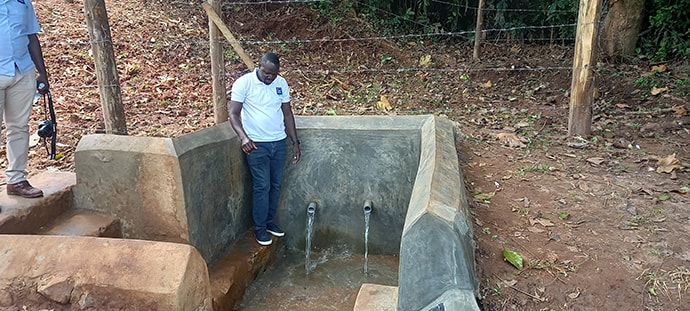
Ibrahim Ogaram at one of the THP constructed community wells. Photo: THP
The Hunger Project (THP), a GlobalWA member since 2018, was founded in 1977 with the goal of ending world hunger. They have ongoing programs in Africa, Asia, and Latin America aimed at mobilizing rural grassroots communities to achieve sustainable progress in health, education, nutrition, and family income. WASH is one of those activities and it is one of the foundations for community health.
THP is exemplary when it comes to the training and empowerment of local actors in communities where they work, and we had the honor of being connected to one of their local WASH and nutrition specialists, a local Ugandan who is a dedicated Food Security and Nutrition Officer with over 12 years of experience in livelihoods, nutrition, and WASH (Water, Sanitation, and Hygiene) practices.
Hello and welcome, Ibrahim. Thank you so much for being willing to talk with us today. Please introduce yourself to our audience…
Thank you very much, Joel. My name is Ibrahim Ogaram from The Hunger Project Uganda. I work as a program officer for Food Security and Nutrition. I’m very passionate about our nutrition project, which includes several thematic areas, one of which is WASH.
This is now my sixth year with The Hunger Project, Uganda. Previously, I worked on an agriculture project that supported organic production without harsh chemicals. Now, I am focused on our nutrition project, which integrates WASH as a key component. Our WASH program focuses on sanitation and training around health and nutrition.
What or who in your upbringing and early professional career drove you to work in community development and WASH activities?
From the time I graduated in 2008, I started working with communities in gardening, where WASH was a priority. Seeing communities improve their hygiene, sanitation, access to clean water, and waste management fueled my passion.
The most interesting thing about WASH is that, when I relate what happened in 2008 to during the COVID time, I realize that the handwashing practices we promoted back then proved crucial during the COVID-19 pandemic, highlighting the importance of WASH. If all the communities in the entire world followed the same procedures automatically, they would even have less or no infection, as compared to the time of COVID-19.
Did you start off in your local community where you grew up? Or was this just where you happened to be living at the time?
My first job took me to a different community in another district, where I worked with 25 communities transferring information and knowledge of WASH as well as other thematic areas. But the emphasis wasn’t on WASH. When I joined The Hunger Project, I was pleased to continue similar work with new communities. What I was doing with the different communities previously is the same that I’m doing with these other communities through The Hunger Project. It is a very natural fit.
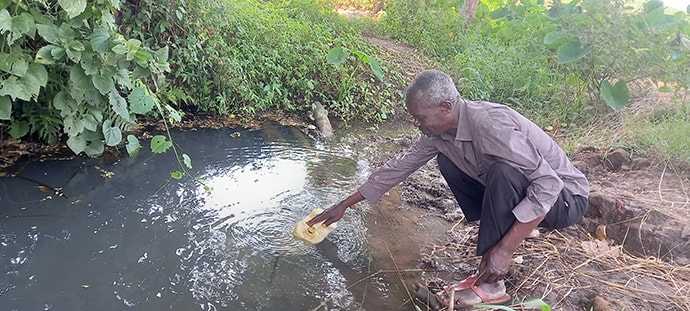
Shallow well used by the community before spring well were constructed by THP-U. Photo: THP
How did you hear about and come to work for The Hunger Project?
Before I joined The Hunger Project, I used to hear about them through the work they do, because one of my neighboring districts where I come from The Hunger Project was working there, so I used to hear about them through the communities they were working with. I also heard of The Hunger Project through radio stations and TV broadcasts. Then, when they advertised for jobs through newspapers and some social media platforms, I got to understand The Hunger Project further and also applied. Luckily enough, I succeeded on my first attempt and joined The Hunger Project Uganda.
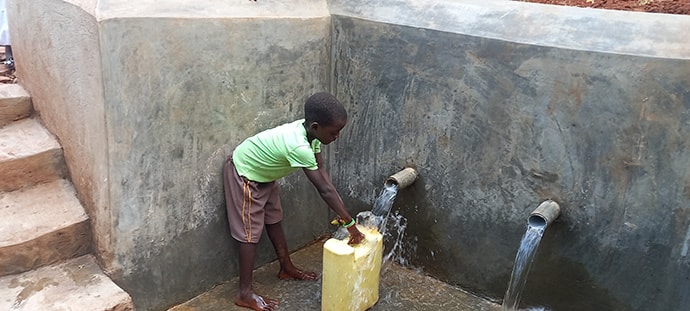
Constructed community spring wells by THP-U. Photo: THP
What is The Hunger Project’s approach or philosophy regarding water access, sanitation, and hygiene?
THP emphasizes community engagement and responsibility. One of the ideas that I learned is, for example, when you’re working on a community water source, it’s not your responsibility to take charge of the water source, but engaging the community to take full responsibility for the water source that is serving them is key, and I see it working so well. For example, with the still water sources, we established water user committees to manage local water sources, ensuring the community takes ownership of maintenance and protection. The committee members are the people fully responsible for taking charge of the water source in terms of cleaning and repairs, terms of protecting it, and so on. To me, it’s really a very great philosophy.
Tell us about some of the projects you’ve been working on – what have you been most excited about?
My very first project with The Hunger Project focused on agroecology and organic farming, which was very fulfilling due to its positive impact on human health. The agroecology project, focused on no use of chemical synthetic fertilizers. We know very well that chemicals and synthetic fertilizers, most of them are causes of human cancers, causes of actual illness to humanity. I saw it as a very exciting project and a pro-community project. The community comes together, producing their own healthy food, and nursing the seeds for planting or regeneration.
Currently, I am excited about our nutrition project, which supports numerous schools and health facilities by improving their access to water and handwashing facilities. This project is dear to my heart because of the number of people it supports are mostly schools. Through this project, we educate and train school children on the importance of handwashing. It is exciting to visit to monitor and witness the impact being made by these supports to the communities. It makes me feel very happy that your hard work is working very well for the community.
How does THP leverage partnerships or collaborations to help their WASH initiatives?
Collaboration is key to addressing WASH comprehensively. As an organization you may not be in a position to do everything about WASH in the community because WASH is a very wide subject that touches on health, water, waste management etc. But you realize that we work with various organizations that focus on different aspects of WASH, such as constructing latrines, providing water facilities, and promoting handwashing to ensure holistic solutions. Collaborating, you find yourself handling WASH holistically in all areas because we know WASH is a very wide subject – that is on health, that is on water, that is on waste management. If you work collaboratively, you find it is handled holistically.
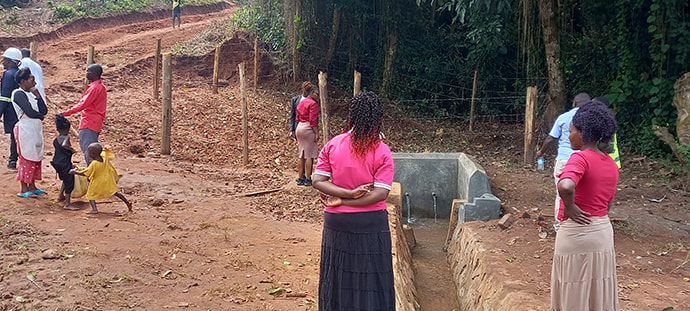
A THP constructed community well. Photo: THP
When looking at the current challenges of climate change, shifting politics, people being forcibly displaced in record numbers… what are you most concerned about?
Climate change has negative impacts on WASH activities. For instance, floods can cause widespread contamination by bringing pollutants and waste into communities, leading to outbreaks of waterborne diseases. On the other hand, droughts result in water scarcity, forcing communities to rely on unsafe water sources. Additionally, strong winds can carry dust and debris that contaminate water supplies and create health hazards.
Then, when you come to politics, political instability and displacement disrupt communities’ access to WASH facilities, exacerbating these issues. These challenges are significant threats to our work. If there’s de-stability in a given country or in a given community, you find people moving from one place to another. They may reach a community where there are no facilities for WASH, like there are no pit latrines, there are no bus shelters, and there are no sources of water. You find such a community getting so much affected as a result of lack of security in a given country. For me, as a WASH specialist, I wouldn’t wish such circumstances to occur in a given country or in a given community.
What’s next for you – are you going to continue with WASH?
I am passionate about WASH and consider it an integral part of my life’s work. In every community I visit, even if my primary purpose is different, I always make it a point to address WASH issues. For example, I often demonstrate how to construct and use simple, low-cost solutions like local pedal tippy taps, which are crucial for promoting handwashing and hygiene. These small actions can have a significant impact, as they are easy to implement and maintain using locally available materials.
Looking ahead, I aspire to become an international expert in WASH. My goal is to expand my reach and share my knowledge and experience with a broader audience. I want to work on larger projects that tackle complex WASH challenges and contribute to global initiatives aimed at improving water, sanitation, and hygiene practices. I believe that by continuing to innovate and collaborate with other professionals and organizations, we can create sustainable solutions that benefit communities worldwide.
Back to Top
Member Blogs
GREDO Delivering Sustainable Water Solutions in Somalia: GREDO’s Holistic Approach
Yemen Relief and Reconstruction Foundation Hope in Every Drop: Bringing Clean Water to Yemen
Back to Top
Welcome New Members
Please welcome our newest Global Washington members. Take a moment to familiarize yourself with their work and consider opportunities for support and collaboration!
Stronger Stories
Stronger Stories is a social enterprise that helps good ideas get the support they deserve. Combining story science with expert coaching/consultancy, Stronger Stories supports organizations and social entrepreneurs dedicated to solving systemic issues. Free tools and online learning to democratize storytelling power are available at strongerstories.org.
Back to Top
Member Events
July 24, 2024
[Webinar] Social Media Content Marketing for Nonprofits
July 30, 2024
[Free Webinar] Mastering Fundraising Metrics: Achieving Your Nonprofit’s Revenue Goals
August 14, 2024
Webinar Transformative Youth Building Knowledge to Drive Social and Political Change | Seattle International Foundation
September 17, 2024
Nonprofit Management Institute | Hosted by the Stanford Social Innovation Review
October 1, 2024
FundraisingAI Global Summit
October 5, 2024
Mona’s 25th Anniversary Celebration, Oct. 5th, Benaroya Hall, 7-9PM
October 6, 2024
2024 Ashesi Deep Dive – Ghana
Back to Top
Career Center
Manager, Policy and Advocacy VillageReach
Development Associate Upaya Social Ventures
Philanthropy Director Upaya Social Ventures
Senior Accountant: Grants and International Accounts Global Impact
Director of Development World Affairs Council
Director of Public Sector Engagement The Max Foundation
Check out the GlobalWA Job Board for the latest openings.
Back to Top
